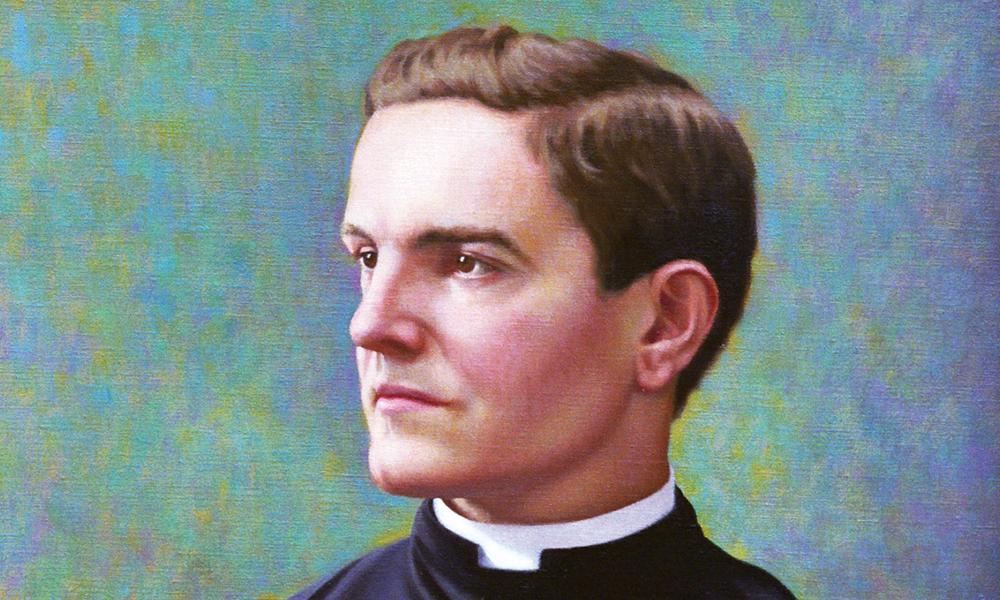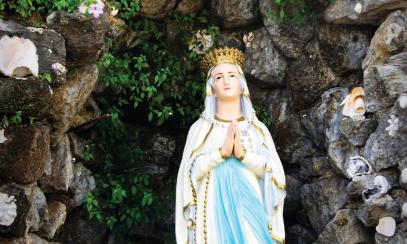
Father Michael McGivney: On the Road to Becoming a Saint
“He was not a martyr, not a missionary, not a bishop, but a regular parish priest who lived that regular parish priesthood in an extraordinarily heroic way.”— Father Walker, pastor of St. Mary Church, New Haven
Father Michael McGivney was a parish priest and founder of the Knights of Columbus. On Oct. 31, 2020, Father McGivney was beatified at the Cathedral of St. Joseph in Hartford, CT. He is now “Blessed Michael McGivney.”
In a decree, Pope Francis praised him for his “zeal for the proclamation of the Gospel and generous concern for his brothers and sisters.” The pope said Father McGivney was “an outstanding witness of Christian solidarity and fraternal assistance.”
Cardinal Joseph Tobin of Newark represented Pope Francis and was principal celebrant at the beatification Mass. The cardinal said, “Father McGivney’s life is an illustration of how a holy priest can provide the necessary and intimate connection, so crucial in the life and mission of a parish. ...The signature accomplishment for which he is remembered, founding the Knights of Columbus, grew out of his ministry as a parish priest.”
Opening the door to the beatification of Father McGivney was a decree from Pope Francis recognizing as a miracle the healing of an unborn boy. The boy had fetal hydrops, a serious and life-threatening condition that results in an abnormal accumulation of fluids in an unborn child. The healing was attributed to the intercession of Father McGivney. The boy, Michael “Mikey” Schachle, five years old, with Down syndrome, attended the beatification ceremony with his family. He walked up the aisle to bring a relic of Father McGivney to Cardinal Tobin.
A SON OF IRISH IMMIGRANTS
Father Michael McGivney was born and raised in Waterbury, CT. His parents, Patrick and Mary, were Irish immigrants. Michael was the eldest of 13 children, six of whom died in infancy or childhood. He left school when he was 13 to work in the spoon-making department of a brass mill. He entered the seminary at age 16.
Because French-speaking immigrants were coming into the Hartford diocese, and Bishop McFarland wanted priests better prepared to minister to them, McGivney was sent to study in Quebec, Niagara Falls, NY, and Montreal. However, when his father died, McGivney left the seminary to help his family.
McGivney resumed studies at St. Mary’s Seminary in Baltimore, MD, and was ordained a priest on Dec. 22, 1877, by Archbishop James Gibbons at the Baltimore Cathedral of the Assumption. Father McGivney’s first assignment was to be curate in St. Mary’s parish, New Haven, CT.
KNIGHTS OF COLUMBUS
Father McGivney was convinced that Catholic men needed some type of fraternal society. He saw how men often struggled to carry out their duties in life. And when the father of a family died, it was devastating to the family. In many cases, widows lived on in poverty.
Along with a small group of Irish-American parishioners, Father McGivney founded the Knights of Columbus. The Knights were to provide spiritual support for men, and, in the event of a man’s death, offer financial assistance to the widow and her children.
After considering various names for the new group, Knights of Columbus was chosen. In a time of tension between Catholics and the wider society, and suspicion about Catholics’ loyalty to the Vatican, the choice of Columbus, a non-Gaelic name, signaled loyalty to the United States, and an openness to all nationalities.
The Knights of Columbus, now an inter-national fraternal society, number more than 2-million members. The Knights generously support families and parishes and carry out numerous charitable projects. They help where there is need.
Carl Anderson, the organization’s supreme knight, said that Father McGivney anticipated Vatican II. His vision “empowered the laity to serve the Church and their neighbors in a new way, through a greater commitment to charity and build effective cooperation between laity and clergy.” Anderson said that the beatification of Father McGivney will “encourage that vision of lay leadership and fellowship.”
THE WORK OF A PARISH PRIEST
Conditions in the time of Father McGivney’s ministry as a parish priest mirrored some of today’s challenges. It was a time of few priests and many Catholics, resulting in multiple du-ties. It is thought that the hard work required to serve Catholic immigrant communities led to early deaths among priests. Diseases easily spread in those close communities. In the 1880s, for a parish priest, there was little hope of reaching 50 years of age and almost none of reaching 70. Father Michael McGivney contracted influenza, leading to pneumonia. He died Aug. 14, 1890, two days after his 38th birthday.
The beatification celebration emphasized Father McGivney’s humility, his holy witness, and his love of the parishioners he served. Archbishop Leonard Blair of Hartford said, “I believe Father McGivney is truly Pope Francis’ kind of priest. A model of his time of close-ness to Christ Jesus on the peripheries of life and society.”



